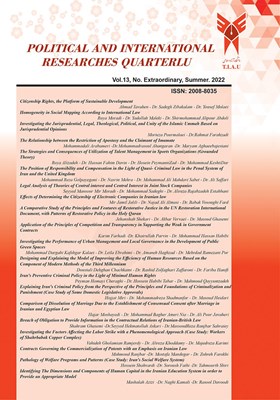A Comparative Study of the Principles and Features of Restorative Justice in the UN Restoration International Document, with Patterns of Restorative Policy in the Holy Quran
Subject Areas : Political and International Researches Quarterly
jehanshah shekari
1
![]() ,
Akbar Varvaei
2
,
MASOUD ghasemi
3
,
Akbar Varvaei
2
,
MASOUD ghasemi
3
1 - PhD student in criminal law and criminology, Kermanshah Branch, Islamic Azad University, Kermanshah, Iran
2 - Full Professor, Department of Criminal Law and Criminology, Amin University of Law Sciences, Tehran, Iran: Corresponding Author
3 - Assistant Professor, Department of Criminal Law and Criminology, Kermanshah Branch, Islamic Azad University, Kermanshah, Iran
Keywords: The holy Quran, Restorative justice, Principles and Features, International restoration Documents,
Abstract :
It is a certain fact that at the end of the 20th century, with the diminution of the role of the penal schools of thought in the process of responding to crime, the grounds for the formation of a type of justice emerged by the reformers of criminal law. which led to the scientific-legal conceptualization of an idea called restorative justice. This type of justice has a series of distinctive principles and characteristics based on its specific elements. The present research, using library resources, with a comparative method and with the aim of comparing these principles and features in the most important restorative document of the United Nations (UN) under the title of the fundamental principles of applying restorative justice programs in criminal matters with what is in the divine verses, has been done. The findings of the research indicate that these principles and features are more of a Quranic title than a product of an international knowledge document of criminology.
_||_


